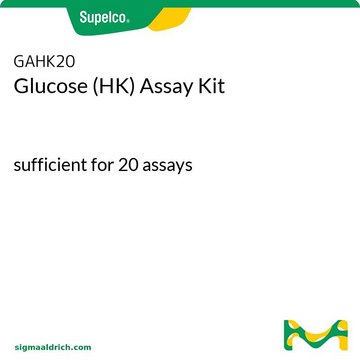MAK489
Glucose Uptake Assay Kit
sufficient for 100 fluorometric tests
Synonyme(s) :
Glucose Uptake Assay Kit
Se connecterpour consulter vos tarifs contractuels et ceux de votre entreprise/organisme
About This Item
Code UNSPSC :
12161503
Nomenclature NACRES :
NA.84
Produits recommandés
Niveau de qualité
Application(s)
pharmaceutical
Méthode de détection
fluorometric
Maladie(s) pertinente(s)
endocrinological disorders, diabetes; cancer
Conditions d'expédition
wet ice
Température de stockage
−20°C
Catégories apparentées
Description générale
Glucose uptake has a variety of methods and transporters and depends upon the metabolic demand of the cell type and availability of glucose. There are over ten different facilitated diffusion glucose transporters which transports glucose down its concentration gradient without ATP hydrolysis. In the kidneys, secondary active transport is used to uptake glucose against its concentration gradient to ensure that very little glucose is excreted in urine.
Caractéristiques et avantages
- Linear detection range: 0.1 µM to 5 µM 2-DG6P
Adéquation
The kit is suitable for the determination of glucose uptake in whole cells and the evaluation of effects of ligands or drugs on glucose transport.
Principe
The Glucose Uptake Assay Kit is a fluorescent cell-based assay that uses 2-deoxyglucose (2-DG), a widely used glucose analog because it can be taken up by glucose transporters and metabolized by endogenous hexokinase, into 2-deoxyglucose 6-phosphate (2-DG6P). 2-DG6P accumulates intracellularly because it is not a suitable substrate for phosphoglucose isomerase, the next step in glycolysis. The cells are lysed, and excess NADP and glucose 6-phosphate dehydrogenase (G6PDH) is added to metabolize 2-DG6P and generate a molar equivalent amount of NADPH. The NADPH is then measured using a G6PDH recycling reaction to amplify the signal and generate a fluorescent signal measureable at λEx = 530 nm/λEm = 585 nm proportional to the concentration of 2-DG6P.
Mention d'avertissement
Danger
Mentions de danger
Classification des risques
Eye Dam. 1 - Met. Corr. 1 - Skin Corr. 1B
Code de la classe de stockage
8A - Combustible corrosive hazardous materials
Classe de danger pour l'eau (WGK)
WGK 3
Certificats d'analyse (COA)
Recherchez un Certificats d'analyse (COA) en saisissant le numéro de lot du produit. Les numéros de lot figurent sur l'étiquette du produit après les mots "Lot" ou "Batch".
Déjà en possession de ce produit ?
Retrouvez la documentation relative aux produits que vous avez récemment achetés dans la Bibliothèque de documents.
Notre équipe de scientifiques dispose d'une expérience dans tous les secteurs de la recherche, notamment en sciences de la vie, science des matériaux, synthèse chimique, chromatographie, analyse et dans de nombreux autres domaines..
Contacter notre Service technique


![2-Deoxy-2-[(7-nitro-2,1,3-benzoxadiazol-4-yl)amino]-D-glucose ≥97% (HPLC)](/deepweb/assets/sigmaaldrich/product/structures/104/527/40bd5a41-ebc4-484e-a10e-891fecfaea79/640/40bd5a41-ebc4-484e-a10e-891fecfaea79.png)
